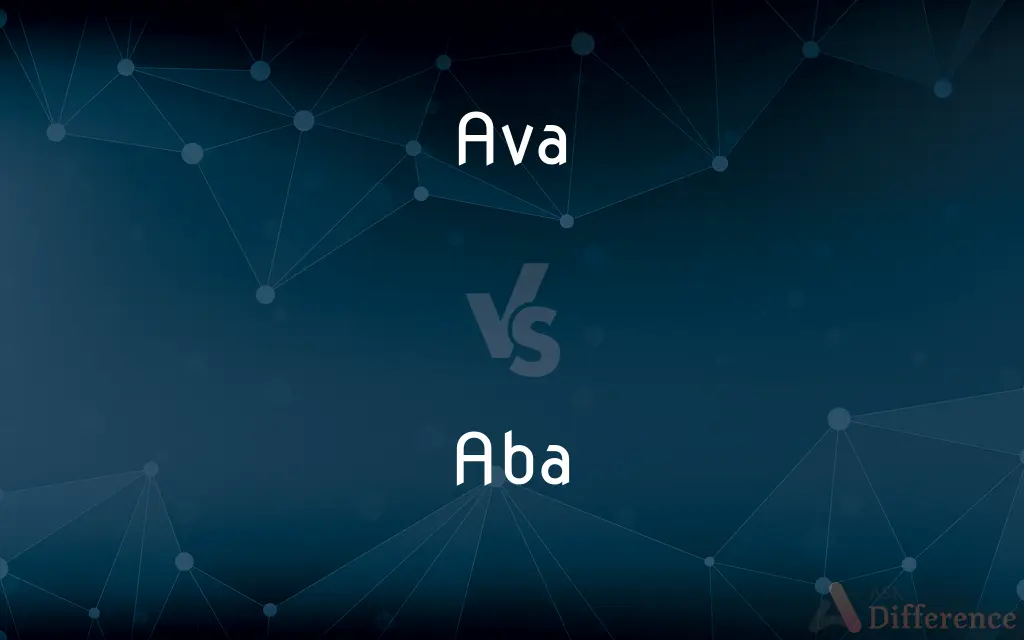Ava vs. Aba — What's the Difference?
By Tayyaba Rehman & Maham Liaqat — Updated on May 21, 2024
Ava is a feminine name of Latin origin meaning "life" or "bird," while Aba is a name of Hebrew origin meaning "father" or a traditional Ghanaian name often given to girls born on Thursday.

Difference Between Ava and Aba
Table of Contents
ADVERTISEMENT
Key Differences
Ava is a popular feminine name with Latin roots, commonly understood to mean "life" or "bird." It has gained widespread use in many English-speaking countries due to its simplicity and elegance. Ava is often chosen for its melodic sound and positive connotations. Aba, on the other hand, has different cultural and linguistic origins. In Hebrew, Aba means "father," often used as a term of endearment. Additionally, in Ghanaian culture, Aba is a name given to girls born on Thursday, aligning with the Akan tradition of naming children based on the day of the week they were born.
Ava is frequently seen in contemporary contexts, often associated with grace and vitality. It is a popular choice for parents looking for a modern yet timeless name for their daughters. Celebrities and fictional characters named Ava have contributed to its enduring popularity. Aba, while less common in English-speaking countries, carries significant cultural and historical importance in its respective origins. In Hebrew-speaking communities, it serves as a term of endearment for fathers, whereas in Ghanaian culture, it reflects a connection to traditional naming practices and heritage.
The usage of Ava is primarily as a given name for females, celebrated for its brevity and beauty. It has a global appeal, making it a favored choice across various cultures. The name's popularity is bolstered by its appearances in media and literature. In contrast, Aba's usage varies between being a personal name and a term of respect. In Ghanaian contexts, it functions as a unique identifier linked to cultural identity and tradition. As a term in Hebrew, Aba signifies respect and affection, primarily used within family settings.
Comparison Chart
Origin
Latin
Hebrew (father) / Ghanaian (Thursday-born)
Meaning
Life, bird
Father (Hebrew), Thursday-born (Ghanaian)
ADVERTISEMENT
Gender Association
Feminine
Masculine (Hebrew), Feminine (Ghanaian)
Usage Context
Given name
Given name / Term of endearment
Popularity
Common in English-speaking countries
Less common, culturally specific
Compare with Definitions
Ava
A feminine name of Latin origin.
Ava is one of the top baby names this year.
Aba
Less common in English-speaking countries.
Aba is a unique name in the Western world.
Ava
Meaning "life" or "bird."
The name Ava signifies life and vitality.
Aba
Reflects cultural heritage and tradition.
Aba’s name connects her to her Ghanaian roots.
Ava
Frequently used in media and literature.
The main character in the novel is named Ava.
Aba
A Hebrew term meaning "father."
He calls his dad Aba out of respect.
Ava
Known for its simplicity and elegance.
Ava has a timeless appeal.
Aba
Used as a term of endearment in Hebrew-speaking families.
Children lovingly call their father Aba.
Ava
Popular in English-speaking countries.
They named their daughter Ava after her great-grandmother.
Aba
A fabric woven of the hair of camels or goats.
Ava
Alternative form of kava
Aba
A loose-fitting sleeveless garment made of this fabric or of wool, traditionally worn by Arabs.
Ava
Same as Kava.
Aba
See abaya.
Aba
A coarse, often striped, felted fabric from the Middle East, woven from goat or camel hair.
Aba
A loose-fitting sleeveless garment, made from aba or silk, worn by Arabs.
Aba
An outer garment made of the above, very simple in form, worn by the Arabs of the desert. The illustration shows such an aba, made of two breadths of stuff sewed together to make an oblong about four by nine feet.
Aba
An altazimuth used for astronomy on either land or water.
Aba
A loose sleeveless outer garment made from aba cloth; worn by Arabs
Aba
A fabric woven from goat and camel hair
Aba
A Ghanaian name for girls born on Thursday.
In Ghana, Aba is a common name for girls born on Thursday.
Common Curiosities
What does the name Ava mean?
Ava means "life" or "bird."
Can Aba be used for girls?
Yes, in Ghanaian culture, Aba is used for girls born on Thursday.
What is the origin of the name Ava?
Ava has Latin origins.
What is the origin of the name Aba?
Aba has Hebrew and Ghanaian origins.
Does Aba have a cultural significance?
Yes, Aba has cultural significance in both Hebrew and Ghanaian contexts.
Is Ava associated with a specific meaning?
Yes, Ava is associated with meanings like "life" and "bird."
Is Aba a common name?
Aba is less common globally but significant in Hebrew and Ghanaian cultures.
What does the name Aba mean?
Aba means "father" in Hebrew and "Thursday-born" in Ghanaian culture.
Is Ava a popular name?
Yes, Ava is popular in many English-speaking countries.
Can Aba be a term of endearment?
Yes, Aba is a term of endearment meaning "father" in Hebrew.
Is Ava typically a feminine name?
Yes, Ava is predominantly a feminine name.
Is Ava used in media and literature?
Yes, Ava is frequently used in media and literature.
Is Ava a modern name?
Ava is considered both modern and timeless.
Is Aba used for males in any context?
Yes, Aba is used as a term for "father" in Hebrew-speaking families.
Does Aba reflect a day of the week?
Yes, in Ghanaian culture, Aba is given to girls born on Thursday.
Share Your Discovery

Previous Comparison
Grit vs. Grime
Next Comparison
Filly vs. MareAuthor Spotlight
Written by
Tayyaba RehmanTayyaba Rehman is a distinguished writer, currently serving as a primary contributor to askdifference.com. As a researcher in semantics and etymology, Tayyaba's passion for the complexity of languages and their distinctions has found a perfect home on the platform. Tayyaba delves into the intricacies of language, distinguishing between commonly confused words and phrases, thereby providing clarity for readers worldwide.
Co-written by
Maham Liaqat










































